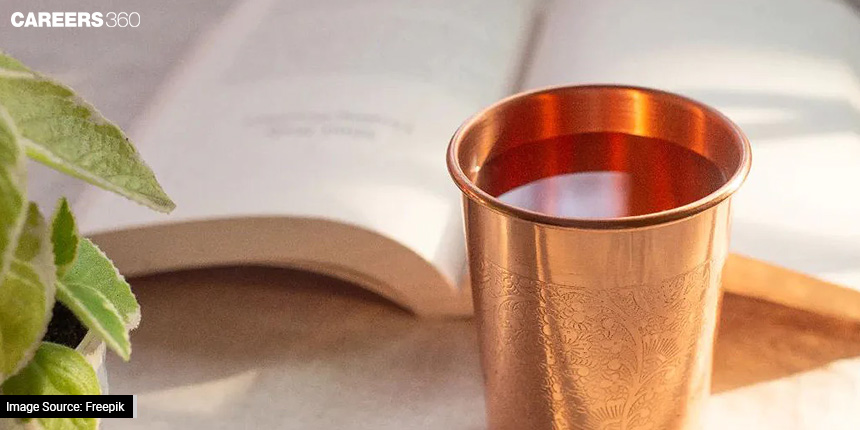Why Does Water Taste Different If You Drink From A Copper Glass?
Have you ever tried drinking water from a shiny copper cup and noticed that it tastes a little different with a faint metallic flavour? Well, this happens because of some interesting stuff that happens when copper and water meet. We're going to explain why this happens, and we'll keep it really simple, especially for students who have learned some science in their NCERT textbooks.
This Story also Contains
- What Is The Science Behind The Metallic Taste?
- The Role of Copper Carbonate
- Factor Affecting Taste

Why does this matter? Well, it's not just about knowing why water tastes a bit like metal in a copper cup. It's also about understanding how science is all around us, even in everyday things like a sip of water. So, let's dive in and explore why this unique taste happens.
Also Read- Measurement Accuracy: How Calculate The Area Of Your Home?
What Is The Science Behind The Metallic Taste?
Now, let's get into the science part – how and why water tastes different in a copper cup.
When copper and water combine, they produce a chemical show. You may have studied chemical reactions in science class. This is how it works: The cup's material, copper, reacts with oxygen from the air. This reaction creates a super thin layer of copper oxide on the surface of the copper. The reaction is as follows:
2 Cu ( s ) copper + O 2 ( g ) oxygen → 2 CuO ( s ) copper oxide
This copper oxide, however, is not the end of the story. It can react with another familiar substance: carbon dioxide. When we talk about the air we breathe, we frequently bring up carbon dioxide. It's all over the place. When copper oxide reacts with carbon dioxide, they combine to form copper carbonate. This is how the reaction looks:
Copper Oxide(CuO) + Carbon Dioxide(CO2) → Copper Carbonate ( CuCO3)
In this story, copper carbonate is the magical ingredient. This is why your water tastes different. This copper carbonate can mix with the water you're drinking, especially if the water has a slight acidity (similar to sourness). When copper carbonate is dissolved in water, it releases copper ions.
The Role of Copper Carbonate
We've talked about copper and its interaction with water, but let's dig a little deeper into what happens next and why you taste that touch of metal.
In our story, copper carbonate is similar to a shy character. It does not always prefer to remain stationary. Something interesting happens when it gets into the water in your copper cup. It begins to dissolve. Now, dissolving is similar to when you stir sugar into tea and it dissolves into the liquid. In water, copper carbonate performs a similar disappearing act. When it dissolves, copper ions are released.
Copper ions are the primary contributors to the metallic taste you detect. They're tiny copper particles that have gotten into your water. When you drink, these copper ions contact your taste buds, and your brain recognises them as a distinct flavour - hence the metallic taste.
As a result, it's a little like magic in your mouth! The copper ions are what give your water a distinct flavour. But don't worry; it's completely safe; it's just some science going on in your cup. So now you know why water in a copper cup tastes so good - it's all because of these tiny copper ions at work in your drink. Isn't that great?
Factor Affecting Taste
We've figured out why water tastes different in a copper cup, but there are a few more factors to consider. Let's look into what makes the flavour stronger or milder.
Have you ever noticed that the metallic taste is more noticeable when your water is extremely cold or extremely hot? This is due to the fact that temperature is important. When the water is at the extreme ends of the temperature scale, the taste can become more intense. So, when the temperature is extreme, the copper ions in the water become more active and noticeable.
Acidity is similar to the sourness of water. Water from different sources can sometimes have varying levels of acidity. If your water has a slightly sour or tangy flavour, it can bring out the metallic flavour. However, if the water is neutral (not too sour or too basic), the taste may be milder. As a result, the acidity of the water influences how strong the metallic taste appears.
Different water sources have distinct characteristics. Some may have more minerals naturally, while others are softer. This means that the metallic taste will differ depending on where the water is sourced. So, if you've ever noticed that the metallic taste is stronger with one water source and milder with another, it's because of water differences.
So, each sip from your copper cup is like a mini-tasting adventure. The metallic flavour can change with water temperature and source. Embrace the uniqueness and enjoy the science in every refreshing gulp!
Applications for Admissions are open.
As per latest syllabus. Physics formulas, equations, & laws of class 11 & 12th chapters
JEE Main Important Chemistry formulas
Get nowAs per latest syllabus. Chemistry formulas, equations, & laws of class 11 & 12th chapters
JEE Main high scoring chapters and topics
Get nowAs per latest 2024 syllabus. Study 40% syllabus and score upto 100% marks in JEE
JEE Main Important Mathematics Formulas
Get nowAs per latest syllabus. Maths formulas, equations, & theorems of class 11 & 12th chapters
